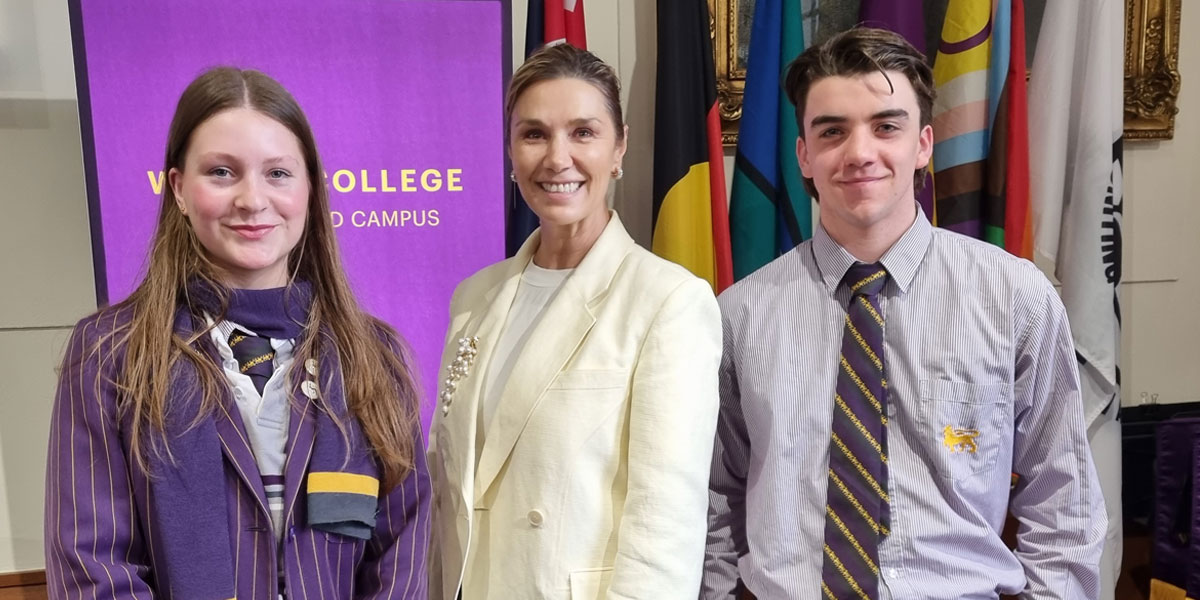Two guest speakers from Country Road and Tikkun Olam Makers (TOM) have enlightened our St Kilda Road Senior School students about the ways they can use design to make changes to people’s lives and the career pathways available within the design industry.

Interestingly, Wesley has a special connection to Country Road as it was founded by Stephen Bennett (OW1965), who was soon after joined by business partner Peter Vial (OW1963) in 1976.
Since then, the company has grown and now includes various initiatives for supporting sustainable business practice. This is an area that greatly interests students, and many are considering how sustainability will have an influence on their future tertiary and career choices.
As Elle Roseby, Managing Director of Country Road, explained to students, ‘You can’t design without thinking about sustainability these days.’
Designers need to understand how different materials can be used, where the materials come from and how we can reduce waste. Consumers are demanding circularity, transparency and responsibility from the brands they choose to support. Country Road was the first Australian fashion retailer to partner with Oritain, in 2019, which enables them to scientifically trace the fibres used in their Verified Australian Merino wool back to a small number of local farms who demonstrate responsible land management and animal welfare practices, and to trace the fibres used in their Verified Australian Cotton range back to local cotton growers who support Better Cotton.
Elle shared with students how Country Road is embedding sustainability into the way they do business. From ethical trade, sustainable farming and sourcing of raw materials, energy efficiency, waste reduction, water stewardship, social development, and health and wellness, there are many areas in which Country Road is analysing its impact on the environment and investing in change.
Maeve, Year 12, who is considering a career in fashion design, said, ‘I have always recognised that environmental sustainability is important in all aspects of the fashion industry, however, Elle’s explanation of social and ethical sustainability and how it needs to be achieved in all business models really inspired me. It encouraged me to re-evaluate the definition of sustainability as not solely the preservation of the environment, but also the nurturing of social and ethical factors in all stakeholders of the business and in the wider community.'
Students are studying sustainable design in class, and for Maeve, the talk was an interesting way to consolidate her knowledge of the topic and to understand more about the challenges that present in the real world.
‘Elle also presented the importance of the constant re-evaluation of brand philosophies. I found it inspirational that she aims for ‘progress over perfection’, and making small changes to get closer to their sustainability goals instead of trying to make products perfect from their introduction. It was a very practical approach to sustainable innovation in the fashion industry, and all industries trying to make a difference to the environment.’ Maeve explained.
TOM is a global community which connects designers and innovators to people with disabilities, the elderly and the poor, in order to develop and disseminate open-source solutions for what they call ‘neglected challenges’. TOM@Schools recently presented a Disability Awareness Session to our Year 10 Product Innovation and Year 11 VCE Product Design classes.
Working with ‘need knowers’, people living with a disability who have an intimate understanding of their unmet needs and who bring forward a challenge to be solved, TOM makers create affordable, customisable and easily replicable solutions.
TOM’s team of ‘Makers’ has designed and produced robotic arms, bespoke exercise machines and kitchen equipment to improve the everyday lives of ‘need knowers’. Consumers can download the files to assemble and customise their products at home, choose a manufacturer to work with or connect with the local TOM community for help.
Students were shown a thought-provoking advert from Apple which demonstrated the ways in which our phones can already support those living with disabilities, such as describing the environment to blind people.
The guest speaker also shared his own lived experience of disability and how TOM has helped him through designing leg supports to aid his mobility. Students were able to ask questions and gain a deeper understanding of how they can consider other perspectives and experiences when designing.
Students in Year 10 Product Innovation have been learning about inclusive design and were able to apply the valuable insights from the incursion to their primary research and develop empathy for their selected target market. Christine Dostie, Head of Design and Technology at the St Kilda Road Campus, said, ‘Students really enjoyed being able to ask questions and learn more about the experience of living with a physical disability to inform their design thinking and product design development.’
It was an insightful afternoon that showed students how they can make a real and tangible difference to people’s lives through design.
